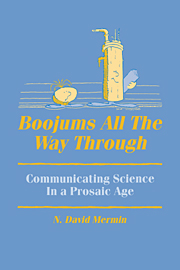Book contents
- Frontmatter
- Contents
- Preface
- I Reflections on the pursuit of physics
- 1 E pluribus boojum: The physicist as neologist
- 2 Commencement address, St. Johns College, Santa Fe, May 18, 1986
- 3 “One of the great physicists … and great characters”
- 4 My life with Landau
- 5 What's wrong with this Lagrangean?
- 6 What's wrong with this library?
- 7 What's wrong with this prose?
- 8 What's wrong with these equations?
- 9 What's wrong with these prizes?
- II The quantum theory
- III Relativity
- IV Mathematical musings
5 - What's wrong with this Lagrangean?
Published online by Cambridge University Press: 02 December 2009
- Frontmatter
- Contents
- Preface
- I Reflections on the pursuit of physics
- 1 E pluribus boojum: The physicist as neologist
- 2 Commencement address, St. Johns College, Santa Fe, May 18, 1986
- 3 “One of the great physicists … and great characters”
- 4 My life with Landau
- 5 What's wrong with this Lagrangean?
- 6 What's wrong with this library?
- 7 What's wrong with this prose?
- 8 What's wrong with these equations?
- 9 What's wrong with these prizes?
- II The quantum theory
- III Relativity
- IV Mathematical musings
Summary
A few months ago I found myself living one of my milder versions of hell, trapped on a flight to Los Angeles, having forgotten to bring along anything to read but Physical Review Letters. Finishing the two articles that had inspired me to stuff it in my briefcase before we even reached the Mississippi, I decided to make the best of a bad thing by taking the opportunity to expand my horizons. Scanning the table of contents, I was arrested by a title containing the word “Lagrangean.”
Funny, I thought, it's not often you see misprints so blatantly displayed. But when I turned to the article, there it was again, “Lagrangean,” in the title and scattered through the text. Well, I thought, an uncharacteristic failure of the copy editing process. The authors were foreign and apparently didn't know how to spell. Copy editors aren't physicists, the word is surely in few if any dictionaries, and so it slipped through.
But I had nagging doubts. Easily resolved, I thought: You can't write an article in theoretical particle physics without a Lagrangian, so I can check it right now. Well, it turns out to be not quite that easy. To be sure, you can't do particle physics without a Lagrangian, but you don't have to call it anything more than L, and many don't. Nevertheless, I found a Lagrangian, fully denominated, in one more article, and there it was, shimmering derisively before my eyes again: “Lagrangean.”
Now I am not a man of great self-confidence, and my secretary will testify that I am a rotten speller.
- Type
- Chapter
- Information
- Boojums All the Way throughCommunicating Science in a Prosaic Age, pp. 52 - 56Publisher: Cambridge University PressPrint publication year: 1990

